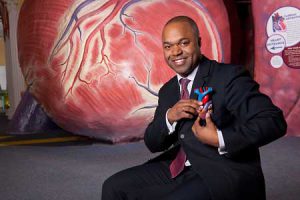
Dr. Frederic Bertley graduated with a PhD from McGill and is currently the Vice-President of Philadelphia’s Franklin Institute, one of the oldest centres of science education and development in the Unites States. On Sunday, Feb. 19, as part of Black History Month, he will be giving a talk about contemporary black and brown scientists who are making significant contributions to science. The Reporter asked Dr. Bertley Four Burning Questions about the Colour Of Science.
Why do we hear so little about scientists of colour?
This is actually a more pervasive problem than we think. If you ask any non-scientist to name three living scientists, most cannot complete the task. You might get as far as Stephen Hawkins or maybe that Mark Green guy, but people really struggle with this. Meanwhile, the first thing that does comes to mind when we hear the term “scientist” is white, male, older, lab coat and pocket protectors. We think Albert Einstein. We do not think about women and we do not think about visible minorities – even though they are “visible.” Finally, layer on the media images of intellectuals and scholars versus media images of pop-stars, entertainers and athletes and you begin to see why we do not know much about scientists of colour. But science is beautiful, it truly can be colour blind.
What kind of support do people from visible minorities need to help them go into science?
The evidence is clear – kids, all kids, are born curious and excited about discovering the world around them. These are the fundamental tenants of science. Studies also show that most students get turned off science by late elementary and middle school grades – where science becomes “hard” and “for the nerds.” The support all students need is a more exciting and engaging formal and informal science experiences throughout their school years.
In addition, students of colour need to see examples of scientists and engineers that look like them so they can identify with these careers and see themselves in those roles. Role models are fundamental. If the only images of themselves that students of colour are shown are athletes and entertainers, and not scholars, intellectuals, scientists, engineers, doctors, lawyers etc.… then they will not think of the wider spectrum of professional opportunities.
What was it like for you as a student?
My personal story is atypical. I am the last of four children, and we all graduated from McGill, even my parents, some of us with multiple degrees. I had the privilege of being raised by incredibly accomplished parents who understood the importance of ensuring that their children, with the right attitude, hard work and perseverance, could accomplish whatever they wanted to in this world. This is really crucial as it emphasizes the importance of your microenvironment – whether its your parents, guardian, neighborhood or community – the environment around you and how you resonate with it is critical for the development of certain strengths and confidences.
From undergraduate research experiences through graduate school, both here at McGill, I had wonderful mentors such as Dr. Wayne Lapp and Dr. Brian Ward. There are opportunities out there, but one has to be well positioned to first recognize these supportive groups and second take advantage of them.
What kind of role can scientists play in society if they are willing to step into the public domain?
As a society, there is a huge disconnect with the idolization, obsession and worship of figures in sports and entertainment versus that directed to scientists and engineers. From computers, to medicines, from cell-phones to GPS, and from agriculture to earth sciences – science, technology and engineering have radically changed our lives. Yet, it is barely celebrated. When was the last time you thought of Mark Zuckerberg, Larry Page, Serge Brin or Bill Gates as a great computer scientist? We know them as successful business people. But as the creators of google, facebook, Microsoft and the iPhone, their true accomplishment is the remarkable applications of mathematics, computer science and engineering. Imagine if we taught our children that.
I want to see rapper Jay Z on the cover of a magazine next to James West (inventor of the microphone). Let us give neurosurgeon Ben Carson the same shine, praise and media coverage as we give to bastketballer Lebron James. That is how we will tip the balance and develop more minority scientists, and encourage the development of more scientists and engineers overall, ensuring a rich diversity of men and women in these important disciplines.
Dr. Frederic Bertley will be speaking about The Importance of Recognizing the Color of Science at the Redpath Museum on Sunday, Feb. 19, at 2 p.m.
For information: Tel: 514-398-4094; www.mcgill.ca/redpath/whatson/other/
